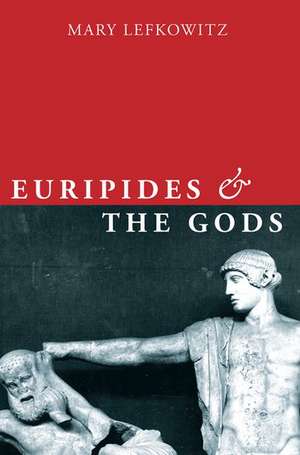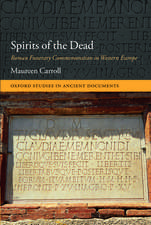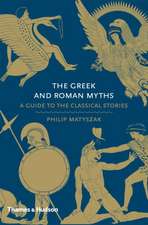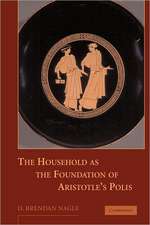Euripides and the Gods: Onassis Series in Hellenic Culture
Autor Mary Lefkowitzen Limba Engleză Paperback – 2 mai 2019
| Toate formatele și edițiile | Preț | Express |
|---|---|---|
| Paperback (1) | 176.37 lei 31-37 zile | |
| Oxford University Press – 2 mai 2019 | 176.37 lei 31-37 zile | |
| Hardback (1) | 437.40 lei 31-37 zile | |
| Oxford University Press – 21 ian 2016 | 437.40 lei 31-37 zile |
Preț: 176.37 lei
Preț vechi: 211.69 lei
-17% Nou
Puncte Express: 265
Preț estimativ în valută:
33.75€ • 36.65$ • 28.35£
33.75€ • 36.65$ • 28.35£
Carte tipărită la comandă
Livrare economică 12-18 aprilie
Preluare comenzi: 021 569.72.76
Specificații
ISBN-13: 9780190939618
ISBN-10: 0190939613
Pagini: 320
Ilustrații: 5 illustrations
Dimensiuni: 211 x 137 x 23 mm
Greutate: 0.39 kg
Editura: Oxford University Press
Colecția OUP USA
Seria Onassis Series in Hellenic Culture
Locul publicării:New York, United States
ISBN-10: 0190939613
Pagini: 320
Ilustrații: 5 illustrations
Dimensiuni: 211 x 137 x 23 mm
Greutate: 0.39 kg
Editura: Oxford University Press
Colecția OUP USA
Seria Onassis Series in Hellenic Culture
Locul publicării:New York, United States
Recenzii
Aimed at the general reader, but useful for more advanced students and professional scholars, too, the book includes summaries of many of the plays, including quotations in literal English translation with some Greek terms transliterated. Accessible, readable, and thought-provoking, it deserves a place on the bookshelves of schools, colleges and universities as well as of anyone interested in Greek drama, culture and religion. Highly recommended.
Although presented -- even by Lefkowitz herself -- as a book for the nonspecialist, scholars will find a wealth of information and solid argumentation in this splendid volume.
This is a book worth noting, and not just because its sober analysis of Euripides' religious beliefs will be required reading for anyone interested in tragedy or Greek religion ... Intriguingly, she diagnoses an anachronism as the cause of that tradition's persistence: foreign to the plays' ancient context is the monotheistic conception of God's relationship to and interest in humanity ... Even detractors will have to engage with her arguments.
Lefkowitz's main point here remains compelling, that the gods in Euripides' dramas are no different than in Homeric epic or the works of Aeschylus and Sophocles ... Chapter 1, the strongest in the book, depicts in great detail the descent of Aristophanic commentary through the ages to twentieth-century critics who believe that the portrayal of the gods must be ironic. This chapter is the work of incisive scholarship, with years of study of ancient, medieval and modern texts brilliantly and clearly displayed.
Lefkowitz presents a potent account for how Euripides's persona of "philosopher on the stage" came about, and describes how it then affected reception of his poetic corpus. If one were only interested in Euripides's original intentions and the likely responses of original audiences, her corrective offers serious food for thought.
This eloquent and accessible study will be of value to anyone who wants to understand Euripides' tragedies and the beliefs about the gods and their influence on human life that they reflect.
A fresh, rich, and accessible approach, from an eminent scholar, to those troubling gods of Euripides (and Sophocles and Aeschylus). Lefkowitz takes them 'literally and seriously,' sweeps away modern misconceptions, and helps build a sounder understanding of the gods in Greek literature, theology, and life.
[Lefkowitz] has written a perceptive account of Euripides's view of the gods and his use of them in his plays ... Lefkowitz writes clear and engaging prose and (or perhaps because) she eschews tendentious and easy theorizing. Thus anyone interested in Euripides, ancient Greek society, or Athenian drama can read this book with profit and enjoyment. Highly recommended.
Although presented -- even by Lefkowitz herself -- as a book for the nonspecialist, scholars will find a wealth of information and solid argumentation in this splendid volume.
This is a book worth noting, and not just because its sober analysis of Euripides' religious beliefs will be required reading for anyone interested in tragedy or Greek religion ... Intriguingly, she diagnoses an anachronism as the cause of that tradition's persistence: foreign to the plays' ancient context is the monotheistic conception of God's relationship to and interest in humanity ... Even detractors will have to engage with her arguments.
Lefkowitz's main point here remains compelling, that the gods in Euripides' dramas are no different than in Homeric epic or the works of Aeschylus and Sophocles ... Chapter 1, the strongest in the book, depicts in great detail the descent of Aristophanic commentary through the ages to twentieth-century critics who believe that the portrayal of the gods must be ironic. This chapter is the work of incisive scholarship, with years of study of ancient, medieval and modern texts brilliantly and clearly displayed.
Lefkowitz presents a potent account for how Euripides's persona of "philosopher on the stage" came about, and describes how it then affected reception of his poetic corpus. If one were only interested in Euripides's original intentions and the likely responses of original audiences, her corrective offers serious food for thought.
This eloquent and accessible study will be of value to anyone who wants to understand Euripides' tragedies and the beliefs about the gods and their influence on human life that they reflect.
A fresh, rich, and accessible approach, from an eminent scholar, to those troubling gods of Euripides (and Sophocles and Aeschylus). Lefkowitz takes them 'literally and seriously,' sweeps away modern misconceptions, and helps build a sounder understanding of the gods in Greek literature, theology, and life.
[Lefkowitz] has written a perceptive account of Euripides's view of the gods and his use of them in his plays ... Lefkowitz writes clear and engaging prose and (or perhaps because) she eschews tendentious and easy theorizing. Thus anyone interested in Euripides, ancient Greek society, or Athenian drama can read this book with profit and enjoyment. Highly recommended.
Notă biografică
Mary Lefkowitz is Andrew W. Mellon Professor in the Humanities, emerita, at Wellesley College. Her many books on classical culture include Women in Greek Myth, Greek Gods, Human Lives, The Lives of the Greek Poets, and Not Out of Africa.





























